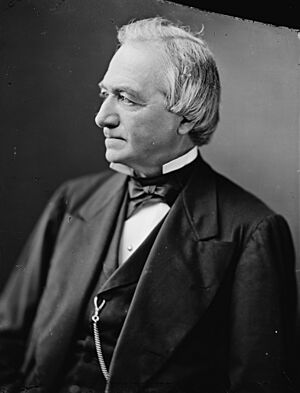Joseph P. Bradley facts for kids
Quick facts for kids
Joseph P. Bradley
|
|
|---|---|

Bradley c. 1870s
|
|
| Associate Justice of the Supreme Court of the United States | |
| In office March 23, 1870 – January 22, 1892 |
|
| Nominated by | Ulysses S. Grant |
| Preceded by | Seat established |
| Succeeded by | George Shiras |
| Personal details | |
| Born |
Joseph Philo Bradley
March 14, 1813 Berne, New York, U.S. |
| Died | January 22, 1892 (aged 78) Washington, D.C., U.S. |
| Resting place | Mount Pleasant Cemetery |
| Political party | Republican |
| Spouse | Mary Hornblower |
| Education | Rutgers University, New Brunswick (BA) |
| Signature | |
Joseph Philo Bradley (born March 14, 1813 – died January 22, 1892) was an important American judge. He served as an associate justice on the highest court in the United States from 1870 to 1892. He also played a key role in deciding the very close 1876 United States presidential election.
Contents
Early Life and Education
Joseph Bradley was born in Berne, New York. He came from a family with little money and was the oldest of 12 children. He started teaching school when he was just 16 years old.
In 1833, a church helped him pay for college at Rutgers University. He graduated in 1836. After college, he became the principal of Millstone Academy. It was there that he decided to study law.
He moved to Newark to study law. In 1839, he became a lawyer.
A Career in Law
Bradley started his own law practice in New Jersey. He became very good at patent law and railroad law. He earned a lot of money from his work. He loved to learn and had a huge library at home.
In 1844, he married Mary Hornblower in Newark. Bradley was also interested in math and insurance. He even wrote an article about old Roman life tables.
Serving on the Supreme Court
Becoming a Justice
On February 7, 1870, President Ulysses S. Grant chose Joseph Bradley to be an associate justice of the Supreme Court of the United States. The U.S. Senate approved his appointment on March 21. He officially became a justice on March 23, 1870. He served on the Supreme Court until he died in 1892.
Important Court Decisions
Justice Bradley believed the national government had strong powers under the Commerce Clause. This part of the Constitution allows Congress to regulate trade. However, he had a narrower view of the Fourteenth Amendment. This amendment is about equal protection and rights for all citizens.
In 1883, Bradley wrote the main opinion in the Civil Rights Cases. This decision said that the federal government could not stop private businesses from discriminating. This made it harder to protect civil rights.
He also agreed with the court's decision in Bradwell v. Illinois. This case was about whether women had a constitutional right to practice law. The court decided that the Fourteenth Amendment did not protect a woman's choice of job.
Bradley played a role in the case of United States v. Cruikshank (1875). This case came from a terrible event where many people were harmed. Bradley's earlier decision in a related case meant that the federal government could not step in to stop private group attacks. This made it harder to protect people's rights in some parts of the country.
In another case, Hans v. Louisiana, Bradley wrote that a state could not be sued in a federal court by one of its own citizens.
Justice Bradley also decided a case involving Charles Guiteau. Guiteau was the person who shot President James A. Garfield. Bradley ruled that Guiteau was properly tried in Washington, D.C.
The 1877 Presidential Election
The Electoral Commission
Joseph Bradley was the 15th and final member of a special group called the Electoral Commission. This group was formed to decide the very close 1876 presidential election. The election was between Republican Rutherford B. Hayes and Democrat Samuel J. Tilden.
Both the House and Senate chose five members each for the commission. The Supreme Court also chose five justices. A key vote was supposed to come from Justice David Davis, who was independent. But Davis left the Supreme Court to join the Senate. Bradley, who was a Republican, took his place. This changed the balance of the commission.
Bradley voted with his own party on the commission. The final vote was 8-7, with all votes split along party lines. This decision made Hayes the president. Many people called Bradley the "casting vote" because his vote was so important. Democrats were very angry with him and he even received threats.
Some people have claimed that Bradley almost voted for Tilden but changed his mind. Bradley always said that no one improperly influenced him.
Later Life and Legacy
Joseph Bradley died in Washington, D.C., on January 22, 1892. He was buried in Mount Pleasant Cemetery in Newark, New Jersey.
His personal papers and legal documents are kept at the New Jersey Historical Society.
In 2021, Rutgers University, where Bradley went to college, removed his name from a building. A university committee studied his time as a judge. They found that some of his decisions made it harder to protect civil rights during the Reconstruction era.
See also
- List of justices of the Supreme Court of the United States
Images for kids
 | Chris Smalls |
 | Fred Hampton |
 | Ralph Abernathy |

